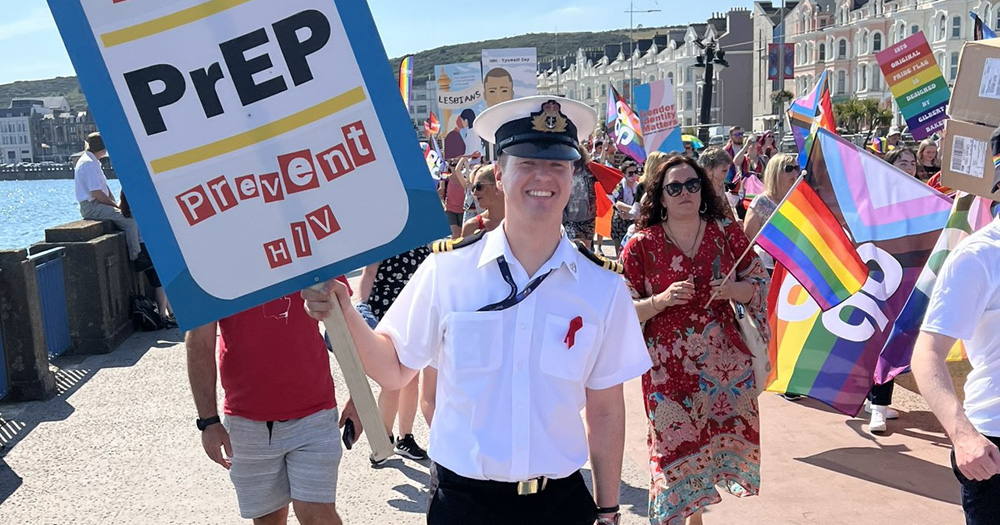On one autumnal afternoon in Battersea, London in 2019, Oliver Brown, a Lieutenant Commander in the British Navy set off on his bike to a colleague’s house in South Kensington.
He was on his way to collect documents from his superior, and just a short distance from his apartment, a plastic bottle became lodged in the spoke of his bike’s wheel. He lost control, crashing into a brick wall along the road, sliding across the pavement on his landing. Though the bike suffered the most from the incident, Brown arrived at Chelsea and Westminster hospital to treat his “shredded” finger. Instead, he received news that would eventually lead him to overturn the British military’s discriminatory policy.
Oliver Brown recalled the moment he was diagnosed, “that was the first time I heard someone say HIV.” He had arrived at the London hospital earlier that day, thinking to be out within a matter of hours. After concerns for Brown may be having internal bleeding, doctors ran a litany of tests – X-rays, blood tests and CT scans. Results revealed his lymph nodes were enlarged – an early sign of the virus. The hospital was part of an opt-out HIV testing scheme.
In an article in the Guardian, Brown explained how if it wasn’t for the test, which “was either chance, coincidence or fate, I still may not know today. I went from a bike accident to concerns of cancer to then having the news broken that I was HIV+ all in just a couple of days.”
He was only 29 at the time and had been serving in the military for the previous ten years. Joining at 19, after being a cadet through his teen years, he undertook training at the Britannia Royal Naval College in Dartmouth, UK.
After finishing the basic officer training at Dartmouth, he joined a mine-hunting ship – “the jewel in the navy’s crown”. After serving in Portsmouth, Scotland and Bahrain, he became Flag Lieutenant to the Second Sea Lord. Brown described it as “being an executive assistant to the deputy CEO and HR director of the navy”. He eventually relocated to London after his boss’s promotion and it was only a matter of months after that that he crashed his bike.
1/6 I have HIV. What does it matter? pic.twitter.com/4jotRgdhk5
— Oli Brown (@OBrownRN) December 1, 2021
Having an HIV Positive status or taking PrEP would no longer exclude anyone from joining the military, or to continue serving in the event of a positive diagnosis. Brown recalled the moment he heard the news, saying “When I got that call telling me it was official and that the prime minister would tweet the announcement… it was the first time I was truly at peace with the fact I was someone living with HIV. I never thought it would happen, let alone so quickly.”
After telling family and friends about his diagnosis, Oliver Brown feared the news that would come from naval medics, saying: “My direct line manager couldn’t have been more supportive… but it took a few days to actually get an answer to the question: what would my career look like?”
That question would soon be followed by a devastating answer. He was downgraded and labelled “medically limited deployable,” deemed (by outdated policy) unfit to fulfil his duties. Brown masked the impact of anxiety and shame that followed his demotion. He experienced a bout of paranoia, second-guessing everything, and was eventually downgraded once again due to depression and anxiety.
“I found myself thinking the thoughts most people used to jump to: you’re dirty, promiscuous, reckless and negligent. Those labels are routinely slapped on to people with HIV.” Brown investigated the British military’s policies on HIV, describing them as “out of touch with the modern day.” At the time, there was a blanket ban on HIV Positive people enlisting, with a similar prohibition against those taking pre-exposure prophylaxis (PrEP).
Out of all policies in place that discriminate against soldiers living with HIV, Brown was shocked at the navy’s concern about flying body shrapnel, saying “It dawned on me that within the navy if I was blown up by an incendiary device, their principal concern was how a small part of my body might transmit HIV to those around me as if I was a virus-laden bullet. But this was almost laughable; certainly not a potential method of transmission.”
With the help of HIV organisations and meetings with the Government Equalities Office, the Department for Health, and the Number 10 policy team, Brown lobbied to change the discriminatory stipulations regarding HIV in military policy. He was backed by scientific evidence about the disease, and how it poses no threat to a soldier’s ability to serve. On December 1, 2021, a press release from the Ministry of Defence read: “Armed Forces make major changes to end HIV being a barrier to service.”
The events of one afternoon in 2019, when Oliver Brown was riding his bike, had set in motion radical change for soldiers living with HIV in the British military.
© 2022 GCN (Gay Community News). All rights reserved.
Support GCN
GCN is a free, vital resource for Ireland’s LGBTQ+ community since 1988.
GCN is a trading name of National LGBT Federation CLG, a registered charity - Charity Number: 20034580.
GCN relies on the generous support of the community and allies to sustain the crucial work that we do. Producing GCN is costly, and, in an industry which has been hugely impacted by rising costs, we need your support to help sustain and grow this vital resource.
Supporting GCN for as little as €1.99 per month will help us continue our work as Ireland’s free, independent LGBTQ+ media.
